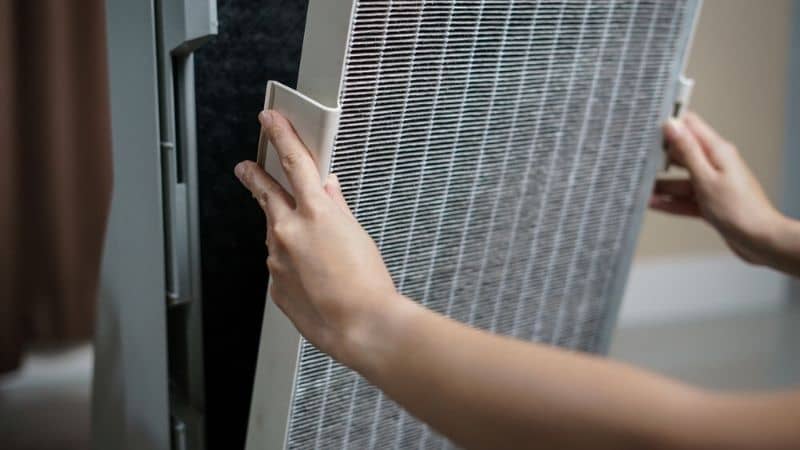When you talk about air pollution then, it is not only about the factories, car exhaust, coal burning, etc., but dust, dirt, pollen, pet dander, and cooking scents inside your home are also a part of air pollution. Now, it is assumed that the contaminants in the air inside your home are far more than they are in the outside air.
Regular cleaning activities inside the home, pet hair, pet dander, cooking, and paint smells are all the main reasons for increased indoor pollution. All these pollutants can cause severe health problems for you and especially for individuals that are experiencing breathing issues.
Leaving the windows open for a while to get rid of these air impurities is not a wise decision because the outside air is not safe as well. Installing an air purifier greatly aids in destroying all these contaminants to breathe in a healthy and clean air.
When you talk about air purifiers, you must have noticed the term “HEPA filter.” Do you know what is a HEPA filter and how does a HEPA filter work? Follow this air purity guide to understand everything about HEPA filters and their working.
What is a HEPA Filter?
HEPA (High Efficiency Particulate Air) filters are the effective filters that are designed to capture 99.97% of particles of size 0.3 microns. HEPA filters were first introduced in the 1940s to trap radioactive components that were produced during the making of the atomic bomb.
They are manufactured to catch the air contaminants of size 0.3 microns that are considered the most penetrating particle size. The air pollutants of this size have a higher probability to pass through the filters than the larger particles.
Most HEPA filters are made of fibers or glass material – twisting in various directions to produce a fibrous labyrinth. This maze does not allow any pollutants to escape through the filter.
How Does a HEPA Filter Work?
To purify the air inside the room, HEPA filters in air purifiers usually employ two distinct processes. To begin, one or more outside filters act as sieves, capturing bigger particles of dirt pollen, and dust.
There is a concertina of what appears like rolled paper within those filters that traps the tiny objects. Unlike gauze, the material is a sheet of very thick glass fibers that do not necessarily filter out tiny particulate matter like a sieve. Rather, three distinct systems are used to trap tiny particles as they travel via the airstream.
Some contaminants are captured and stuck as they crash through the fibers, while others stick on the fibers as they attempt to move by at extremely high air speeds.
Dust particles appear to drift more frequently via the filter at lower air speeds, and they can attach to its fibers in the process. These three processes work together to enable HEPA filters to capture pollutants that are both larger and smaller than a predetermined scale.
When Is It Necessary To Use a HEPA Filter?
HEPA filters, which capture dust, pollen, dirt, mold and mildew, animal dander, and other toxins and viruses, will make a huge impact if you or anyone in your home have asthma or other serious allergic problems.
If you are uncertain about the extent of these allergy causes in your house or workplace, using an air quality machine to check and analyze it on a regular basis is a great idea. There are also house tests that can identify harmful levels of mold, formaldehyde, and other allergens so that they can be handled immediately.
Even if you don't have respiratory problems, HEPA filtration is necessary in certain cases.
1. Water Damage
If your home has been flooded, even if it was caused by a domestic appliance leakage or overflow, using a HEPA filter during the cleanup process will help remove mold spores, bacteria, and other microbes that have appeared as a consequence of the water incursion.
2. Smoke
A fire outside or in your house, whether it is a bushfire or a stove fire, can enable dangerous amounts of smoke particles to build up. Soot and tiny ash molecules produced by these types of fires are captured by a HEPA filter.
3. High Chemical Environment
If you think there are a lot of volatile organic chemicals (VOCs) in the air because of where you live or work, you'll require a HEPA filter that can tackle it. Activated carbon mixed with potassium iodide, potassium permanganate, activated alumina, and/or zeolite are among the filters used.
4. Purified Environment
You will see hyper-HEPA filters that can absorb contaminants as small as 0.003 microns if you are showing concern for somebody who needs a hygienic environment. HEPA filters are built to capture pollutants like bacteria, viruses, and other substances smaller than 0.3 microns.
For sure, even if you are not worried about the overall air quality in your house or workplace, a HEPA filter will significantly enhance your indoor air quality. Our indoor air is much more severely contaminated than outdoor air, according to the CDC and EPA, and because we spend plenty of our time indoors, it makes complete sense to maintain a safe indoor atmosphere.
Hope this air purity guide would have cleared your queries about HEPA filters. Now, you completely understand the HEPA filters, their working, and their importance to provide clean and healthy air to help you breathe safely. Breathing in fresh and pollutants-free air inside a living area will assist you to live a fit and disease-free life. Do not miss to follow us for more effective articles to purify the air inside the room or office for a healthy and pleasing life.
